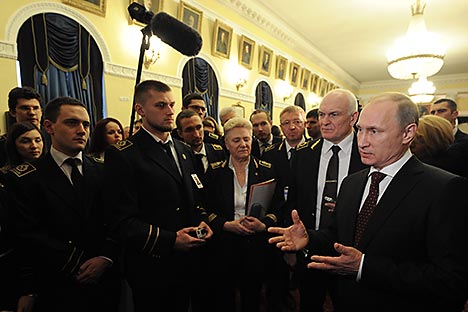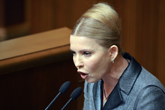Putin: ‘Foreign legion’ operating in Ukraine

According to military experts, Putin unwittingly presented Russia as a party to the conflict in Ukraine. Source:Mikhail Klementyev / TASS
During at visit to the National Mineral Resources University in St. Petersburg on Monday, Jan. 26, Russian President Vladimir Putin accused NATO of interfering in Ukraine and not acting in that country's interests. "We often say: Ukrainian Army, Ukrainian Army. But who is really fighting there? There are, indeed, partially official units of armed forces, but largely there are the so-called ‘volunteer nationalist battalions’,” said Putin.
According to Putin, the Ukrainian army “is essentially no longer an army, it is a foreign legion – in this case a foreign NATO legion – which, of course, is not pursuing Ukraine’s national interests.”
At a press conference at NATO headquarters in Brussels the same day, NATO Secretary-General Jens Stoltenberg called Putin’s comments “nonsense.” “There is no NATO legion, the foreign forces in Ukraine are Russian," Stoltenberg said, urging Russia to stop backing the rebels in the Donetsk and Lugansk regions.
Russian analysts say that Putin’s statements were made out of a desire to emphasize Kiev’s dependence on the U.S. and the EU. Viktor Militaryov, vice president of the Institute for National Strategy, told RBTH that while “of course, the Ukrainian armed forces are not officially a NATO structure,” in his statement, Putin was implying that they are not acting on their own initiative. In Militaryov’s view, Putin was essentially saying that NATO and especially the United States “are using Kiev and its armed forces for geopolitical provocations against Russia.”
According to Iosif Diskin, co-Chairman of the National Strategy Council, Putin’s statements can be interpreted to mean that the U.S. is trying to drive a wedge between Russia and Europe using the Ukrainian armed forces.
Alexander Golts, a military expert and editor-in-chief of the independent Internet portal The Daily Journal, has a different take on Putin’s statements. According to Golts, Putin unwittingly presented Russia as a party to the conflict in Ukraine. “Military actions are under way on Ukrainian territory, not Russian territory. If, in the Russian president’s opinion, the purpose of the military action is to contain Russia, then who is fighting against the voluntary battalions there?” Golts asked.
A signal to the West?
The Russian analysts say Putin’s most recent statements have a harsher tone that his previous statements on the conflict in Ukraine. Militaryov said that this time, the Russian leader expressed himself in “as rigid a manner as possible” in pursuit of a very definite goal.
The Normandy format for talks, so called because the first Normandy Format meeting took place on the sidelines of the commemoration of the 70th anniversary of D-Day in June, is talks involving representatives of Russia, Ukraine, Germany and France. This format is distinct from the Minsk format, which includes representatives from all parties to the conflict in Ukraine as well as representatives of Russia, Belarus the EU and the U.S.
In Militaryov’s opinion, by stressing Kiev’s dependence on the West, Putin was calling on Washington to enter into direct negotiations on the Ukrainian crisis.
Diskin agrees with Militaryov’s assessment that Putin was calling the Western political establishment to the negotiating table. However, in his opinion, Putin’s statements were directed at Brussels, not Washington. “This is a signal to the European Union to consider its interests and construct a policy based not on the already semi-mythical Atlantic solidarity, but on the EU’s interests,” Diskin told RBTH.
Golts, however, disagrees with this perspective. In his opinion, Putin’s words reflect his irritation at the fact that the conflict was not solved in the “Normandy Format” – between Putin, German Chancellor Angela Merkel, French President Francois Hollande and Ukrainian President Petro Poroshenko – which in Putin’s view would have ensured that Ukraine would not join NATO.
Read more: Shelling of Mariupol turns global attention back to Ukraine>>>
All rights reserved by Rossiyskaya Gazeta.
Subscribe
to our newsletter!
Get the week's best stories straight to your inbox
